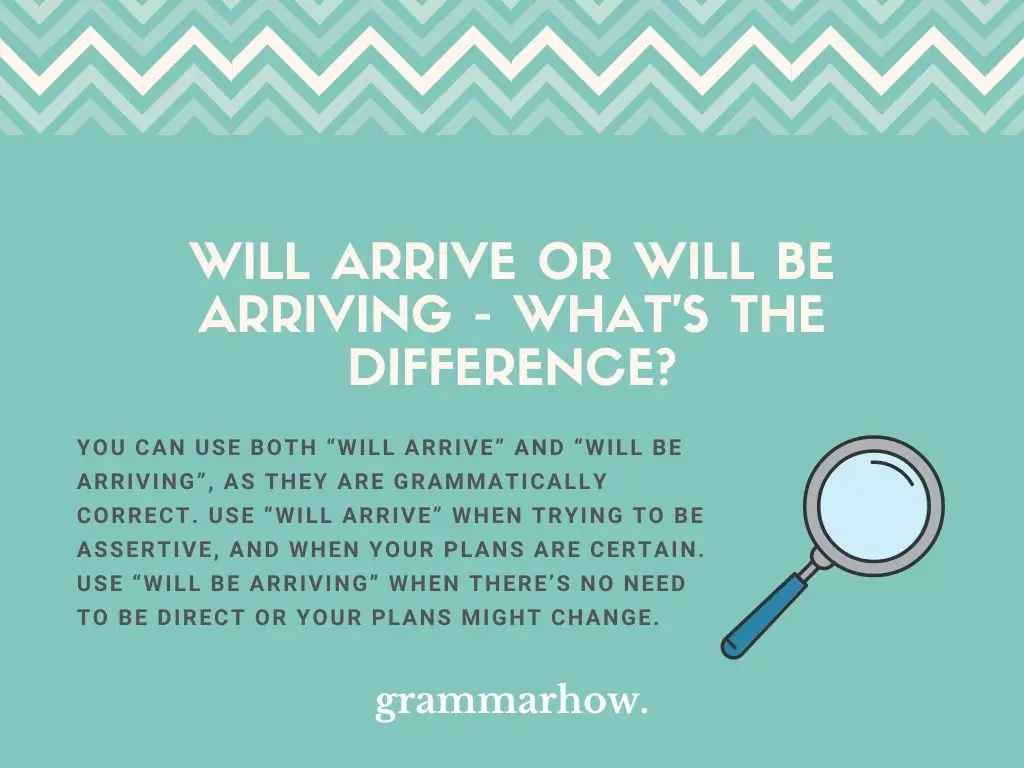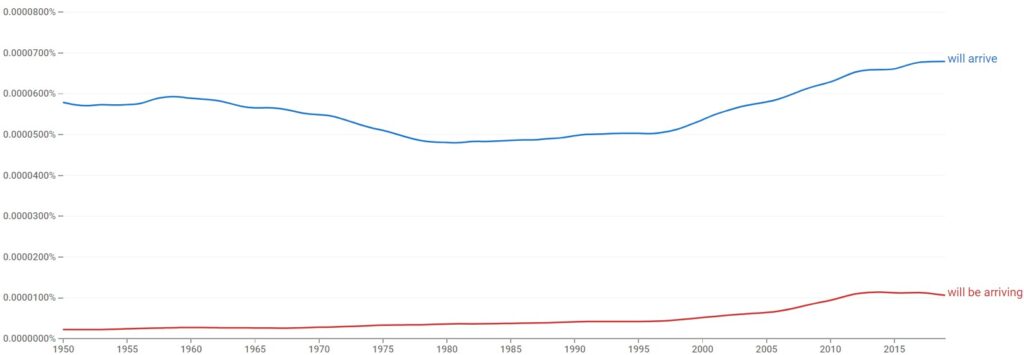When sharing your plans with others, do you say “Will Arrive” or “Will Be Arriving”?
We want to know which of the two forms is correct and how to properly use them. If one of them is incorrect we want to know which, so we can avoid making a mistake.
Will Arrive or Will Be Arriving – What’s the Difference?
You can use both “Will Arrive” and “Will Be Arriving”, as they are grammatically correct. Use “Will Arrive” when trying to be assertive, and when your plans are certain. Use “Will Be Arriving” when there’s no need to be direct or your plans might change.

We shall start by the examples below:
- I will arrive at five in the afternoon.
- I will be arriving at five in the afternoon.
“Will Arrive” and “Will Be Arriving” are interchangeable and can both be used to convey the same message and meaning. Someone might argue that “Will Be Arriving” is more informal or casual, but that could be argued, depending on context.
You’ll be able to make up your own mind by the time we’re done.
Will Arrive
“Will Arrive” indicates your exact plans: where you’re going, how you’re getting there, or what time you’re going to arrive. The more specific you wish to be in your communications, the more reason you’d have to choose the form “Will Arrive”, instead of “Will Be Arriving”.
Let’s look at how to use “Will Arrive” in a sentence:
- I will arrive in Canada on Monday.
- I will arrive home in thirty minutes.
- She will arrive at the party in an hour.
- I will arrive in the UK on the 7th of June.
- They will arrive home in three hours.
“Will Arrive” is an assertive way to express your plans. Perhaps, this is why some people argue that the more concrete your plan is, the more reason to choose this form over “Will Be Arriving”.
Either way, “Will Arrive” sounds objective and, to a certain extent, decisive. So you want to keep that in mind, when choosing how to express yourself.
Will Be Arriving
“Will Be Arriving” means and works just like “Will Arrive”. However, it seems to carry a little bit of uncertainty, as if plans weren’t fully confirmed or could change. Some people argue that you should use this form when you don’t want to be too specific, for whatever reason.
This is how to use “Will Be Arriving” in a sentence:
- Harry will be arriving later today.
- I will be arriving at the airport in a few hours.
- Vanessa will be arriving tomorrow.
- The twins will be arriving home in a few days.
- David will be arriving to work in two hours.
You can interchange “Will Be Arriving” for “Will Arrive”, and the sentences would still work just fine. The idea of being more or less specific is a suggestion, but doesn’t make one or other option incorrect at all.
You can always choose the option you’re more comfortable with. However, here’s one tip: “Will Be Arriving” works particularly well if you wish to intentionally sound unspecific.
Even if you have all your plans arranged to the detail, you may not wish to share it with the world. For those cases, “Will Be Arriving” is a good choice.
Which Is Used the Most?
In real conversations and emails, for example, do you think people would say “Will Arrive” or “Will Be Arriving” more often? We’ll take a look at the graph from Google Ngram Viewer below, for the answer.

In fact, “Will Arrive” is predominant, being used with much more frequency than “Will Be Arriving”. Would that be because people like to be specific when sharing their plans? Or maybe, would it be because in a professional environment you’d wish to sound certain of your plans?
It’s hard to tell, right? Still, the fact is “Will Be Arriving” appears to be used way less often than “Will Arrive”.
Final Thoughts
“Will Arrive” and “Will Be Arriving” have the same meaning and use. They can be interchanged, but give preference to “Will Arrive” when you have set plans that won’t change. Use “Will Be Arriving” when your plans aren’t so certain, and could change.
You may also like: “Arrive To”, “Arrive At”, or “Arrive In”? Correct Preposition

Martin holds a Master’s degree in Finance and International Business. He has six years of experience in professional communication with clients, executives, and colleagues. Furthermore, he has teaching experience from Aarhus University. Martin has been featured as an expert in communication and teaching on Forbes and Shopify. Read more about Martin here.
